- History of the Grand Lodge of Antioquia – Final Part - November 16, 2020
- History of the Grand Lodge of Antioquia – First Part - October 31, 2020
HOW THE DEPT. OF ANTIOQUIA FeLL UNDER THE JURISDICTION OF THE GRAND LODGE OF THE REPUBLIC OF COLOMBIA, BOGOTA’
The Grand Lodge of the Republic of Colombia was established in Bogotá on 19 February 1922. Eleven years later its Grand Master Tulio Rubiano signed a document that attested that the Grand Lodge of the Republic of Colombia had jurisdiction over the Departments of Cundinamarca, Cauca, Huila, Narino and the local administrations of Meta & Vaupes, Putumayo and the Caqueta Police Station.
This proves that the Dept. of Antioquia was not controlled by the Grand Lodge of the Republic of Colombia, based in Bogotá. So how did it later fall under that jurisdiction ?
Everything points to the political divisions at the end of 1929 within the Liberal Party between Enrique Olaya, the candidate running for the Presidency of Colombia and the chairman of the Party Alfonso Lopez. Such disagreements also influenced the breaches that appeared within the Grand Lodge of the Rep. of Colombia, based in Bogotá in 1932, 10 years after its creation.
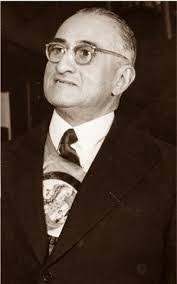
Dario Echandia , a follower of Alfonso Lopez’s ideology, in a document published in the newspaper El Pueblo Libere expressed the opinion that at the Assembly of 7 August 1932 some sectors of the Bogotana Freemasonry, in order to win a majority, applied devious tactics. One of those fraudulent actions consisted in the exclusion of four most respected Lodges:
- Propagadores de la Luz N.1
- Luz de Girardot N.2
- Murillo Toro N.3
- Filantropia Bogotana N.5
The first three being the founding Lodges of the Grand Lodge of the Rep.of Colombia. [1]
Even more regretful events – stated emphatically Echania – took place at the election of the high dignitaries and officers of the Grand Lodge on 7 Aug 1933, which no doubt emphasized the rift within the Bogotana Grand Lodge. “Not only were several Masons from the group led by Echandia prevented from participating” wrote the historian M. Arango “but others who were present and voted , were irregulars” [2].
The delegate Marco Tulio Amorocho proposed to suspend the assembly but his motion was rejected. The elections for the office of Grand Master of the GL of the Rep. of Colombia, based in Bogotá, between the olaysta[3] Tulio Rubiano and the candidate supported by Echandia – the lopista [4] Alberto Dupuy – culminated in a tie of 21 votes. A draw was held, as stipulated by the Statutes, which resulted in Tulio Rubiano coming out the winner.
After these events, Echandia and the lopista faction met on 4 October 1933 with the four excluded lodges and agreed to reconvene in assembly in the Bogotá Masonic Temple on 23 October to found the Legitimate & Regular Grand Lodge of the Rep.of Colombia with Echandia as Grand Master. The schism within the Bogotana Grand Lodge was thus achieved and made official.
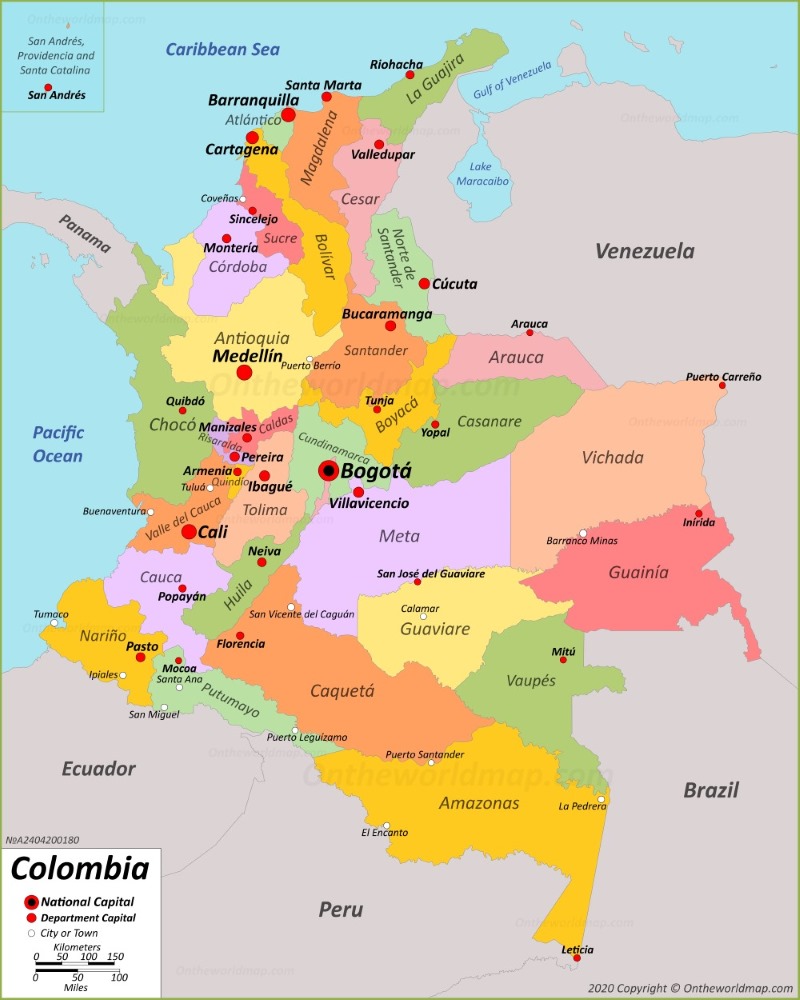
On 10 November 1933 Tulio Rubiano responded to Echandia’s move by ordering the “pulling down of the columns” of the Lodges Propraganda de la Luz 1, Luz de Girardot 2, Murillo Toro 3 and Filantropia Bogotana 5 and the permanent suspension from the Masonic Order of Dario Echandia and the lopista faction, for “schism and rebellion” “heinous conspiracy” and for “undermining this Grand Loge”.
The “sine qua non” condition for the working of a Grand Lodge is to have at least three regularly constituted Lodges under its jurisdiction. The schism brought on by Echandia, greatly weakened the Grand Lodge of the Rep. of Colombia, based in Bogotá, which now had only four lodges left in its jurisdiction. Worse, two of them – the Respectable Loge Estrella de Pubenzain (from the city of Popayan) and the Respectable Loge Estrella del Combeima (from the city of Ibague) – were on the brinck of becoming irregular and cause the GL to lose its status.
Faced with this problem, the Grand Master Tulio Rubiano approved the constitution of four new lodges to be filled with the numerous master masons who had retired from the old Resp. Lodge Estrella del Tequendama. The Lodges and their respective dates of creation were : Lealtad (4 January 1934), Fraternitad (22 September 1934), Veritas Vinci (22 September 1934) and Logia Francisco de Paula Santander (1 November 1934). To consolidate itself as a GL and guarantee its legitimacy over Dario Echandia’ s breakaway Legitimate Regular GL of the Rep.of Colombia, based in Bogotá, Tulio Rubiano supported the creation of new Lodges even in cities that were under the jurisdiction of the Grand Lodge of Cali and of the Serenisima National Grand Lodge of Colombia based in Cartagena.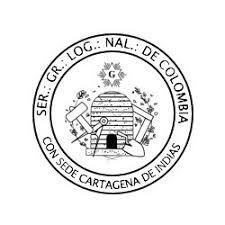 To accomplish the objective and legitimise a Grand Orient , Rubiano appointed to the task Americo Carnicelli, the Venerable Master of the Lodge Fraternitad of Bogotá.
To accomplish the objective and legitimise a Grand Orient , Rubiano appointed to the task Americo Carnicelli, the Venerable Master of the Lodge Fraternitad of Bogotá.
But the move brought about conflicts of territorial jurisdiction and on 27 August 1934 the Serenisima National Grand Lodge of Colombia, based in Cartagena, decided to to forego the Treaty of Friendship and Recognition that it had signed on 11 August 1921.
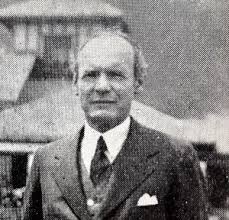
Americo-Carnicelli
On 13 September 1935, Carnicelli attended a meeting at the Grand Lodge of Cali and recommended its members to sign a Treaty of Peace, Friendship and Recognition with the GL of the Rep. Of Colombia, based in Bogotá, presided by Tulio Rubiano.
Amongst the issues covered by the Treaty were:
- That the GL of Bogotá relinquished, with feelings of frank friendship, the territories of Cauca and Narrino
- That the GL of Cali must undertake to assign those territories when in each one of them exists a sufficient number of Lodges to form the GL of Cauca and Narino
- That the Gran Logia de Occidente [5] must undertake to sign a Treaty of Friendship with the GL of Antioquia and Caldas and with those others that are regularly constituted in the Republic, at the rate of one per department
- That the Gran Logia de Occidente must commit to uphold Masonic legitimacy and fight every rebel movement
- That the Gran Logia de Occidente must attend the approaching Grand Masonic Congress organised by the GL of Bogota’.
However, the proposed Treaty was not well received by the GL of Cali which denied the legality of Rubiano’s GL of the Rep. of Colombia, based in Bogotá , and instead recognised the breakaway Legitimate Regular GL of the Rep.of Colombia presided by Dario Echandia.
This further undermined the GL of the Rep. of Colombia because out of the Grand Lodges based in the cities of Barranquilla, Cartagena, Medellin and Cali, only the GL of Antioquia (based in Medelin) recognised the legality of Rubiano’s Grand Lodge; no doubt out of gratitude since it owed its own existence to it.
On 17 August 1936, the Olaysta and the Lopista Grand Lodges of Bogotá congretated to resolve their differences and overcome their conflicts by signing a Treaty of Peace, Friendship, Jurisdiction and Limits. This act enabled the creation of the new Grand Lodge of Colombia of Ancient, Free and Accepted Freemasons , which later changed its name into The Grand Lodge of Colombia.
Amongst the resolutions reached in that assembly was that only the Serenisima National Grand Lodge of Colombia based in Cartagena – which in 1934 had jurisdiction over the Department of Antioquia and Calda – had the right to issue the Grand Lodge of Antioquia with a Patent.
After this Treaty was signed, the new Grand Lodge worked without divisions and with a great sense of fraternity. Rubiano decided to follow the political current of Echandia and supported his Presidential nomination in 1937. The Masonic conflicts in Bogotá eventually ended and that laid the path to the union of the Colombian Freemasonry. However, in 1941, the Bogotá based GL of Colombia decided to unilaterally intervene in the Department of Antioquia.
THE CREATION OF THE GL OF THE DEPT. OF ANTIOQUIA
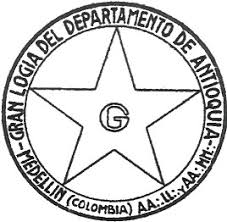
In order to enhance the Bogotá Grand Lodge’s stand, which was being diminished by the lack of recognition and the fewer Lodges remaining under its jurisdiction, Tulio Rubiano entrusted Americo Carnicelli with the task of founding Lodges in other Colombian Departments that were under the jurisdiction of Bogotá. Amongst those departments was Antioquia where Carnicelli encountered favorable grounds for the Grand Master Tulio Rubiano’s plan. He found that the Respectable Lodge Sol de la Montana No.8 [6] was being afflicted by internal conflicts. The “arbitrary” methods of its Venerable Master Fernando Estrada had induced a group of Masons – and it is important to note that the Lodge had a sizable number of them – to write a letter that demanded their removal from the Lodge. Here is its text :
TO THE MASONS OF THE COUNTRY
The undersigned, members of the Lodge Sol de la Montana N.8, with the sadly but sure conviction that in our Workshop the high standards and goals of our respected Institution were forgotten and that through so many years we have lived in the midst of the most disconcerting passivity and the most apathetic morass [7], convinced that Bro. Fernando Estrada, Deputy GM, ex Venerable and spiritual leader of the Lodge Sun of the Mountain, does not share our ambitions, and that he daily violates , for small personal acrimony, the statutes, codes and regulations and lastly but not least he shows himself to be baseless and deeply malicious with the new Resp. Lodge Claridad N.12 where one lives in the most cordial fraternal atmosphere, and which is composed of intelligent, active and spirited members, full of programs, of aspirations and beautiful Masonic plans of immediate realization, we see ourselves in the imperative situation of abandoning the Lodge Sun and Mountain and enter the Claridad Lodge N.12 , sure as we are that its Workshop represents the Masonic future of Antioquia and it agrees with our young desires for fraternal and effective prosperity in our Valley.
M.R. Carling (ex Vea Sol de la Montana)
Gabriel Tobon Correa (Gr 2)
Carlos Jamarillo Gil (Gr 3)
Arturo Uribe Arbelaez (Gr 2)
Thanks to Carnicelli’s intervention, those unhappy Masons from the Lodge Sol de la Montana Levante No. 8 and some others that came from the Lodge Claridad N.12 [8] were able to found two new Lodges. The Fiat Lux N. 14 and the Victoria N.15 received their Patent on 2 December 1934 from the Grand Lodge of the Rep. of Colombia,based in Bogotá.
Two weeks later, on 16 December, the GL of the Dept. of Antioquia was established in Medellin. Its Installation Manifest is reported below :
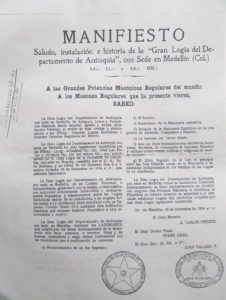
To the Grand Regular Masonic Powers of the world
To the Regular Masons who see it,
BE INFORMED OF THE FOLLOWING:
The GL of the Dept of Antioquia, based in Medellin, of Ancient Free and Accepted Masons has the special pleasure and deep fraternal satisfaction, of sending its most cordial and effusive greetings to the RResp Symbolic Grand Lodges & Great Regular Orients of the World.
The GL of the Dept. Of Antioquia, based in Medellin, has been legally constituted by the RResp LLog Claridad N. 12, Fiat Lux N.14 and Victoria N.15 – of the same Order- with the authorization of the GL of the Rep. of Colombia based in Bogota’, presided by Tulio Rubiano and by virtue of decrees No. 6 and 7 – both dated 15 December 1934 – and which we publish below.
The GL of the Dept of Antioquia, based in Medellin, is a Sovereign and Independent Body, self governed and responsible with entirely indisputable dogmatic and administrative authority over the Symbolic Lodges within its jurisdiction, and in no way subject to (or sharing such authority with) a 33rd Degree Supreme Council or any other Masonic Institution claiming ritualistic dominance or other intervention or control.
The GL of the Dept of Antioquia, based in Medellin, recognises the LANDMARKS which constitute the fundamental bases of Masonry; it only makes Masons into free men of good morals and demands intimate conformity with the conditions enlisted below:
- Recognition of a Supreme Being
- The Secret
- Symbolism of Operative Masonry
- Division of symbolic masonry in the three degrees of Apprentice, Companion and Master
- The legend of the third degree
- Its dominant aims are of charitable, benevolent, educational nature , of veneration of the Supreme Creator, and exclude political and religious controversies of a sectarian nature
- The Volume of Sacred Law , the main one among the Three Lights of Masonry, requiring an indispensable necessity of obedience in the workings of the Lodges
The GL of the Dept of Antioquia, based in Medellin, has sovereign territorial jurisdiction , that is to say : it has exclusivity and does not share it with any other Masonic, Symbolic or Philosophical Power nor it intends to extend its authority to (or intends to establish Lodges in) territories occupied by a legally constituted GL.
Or .’. de Medellin, Dec 16 1934
The Great Teacher CARLOS FETONTI
The Great Fiscal Orator RUEN URIBE
The Grand Secretary JUAN VALLEJO P.
To go to the second and final part of this paper, click here.
No part of this article may be reproduced without permission from the author. The Editor of Tetraktys takes no responsibility for the correctness of the facts and dates reported in this article which remain that of the author.
[1] Mario Arango Jaramillo, Masoneria y Partido Liberal, otra cara en la historia de Colombia (Medellin: editorial Conselva,2006)
[2] ditto
[3] Follower of the ideas of Enrique Olaya
[4] Follower of the ideas of Albert Lopez
[5] Gran Logia de Occidente de Colombia located in Cali
[6] constituted in 1922 and working under the jurisdiction of the Serenisima National Grand Lodge of Colombia, based in Cartagena
[7] A complicated or confused siuation
[8] They were both under the jurisdiction of the Serenisima Nacional Grand Lodge of Colombia based in Cartagena.
